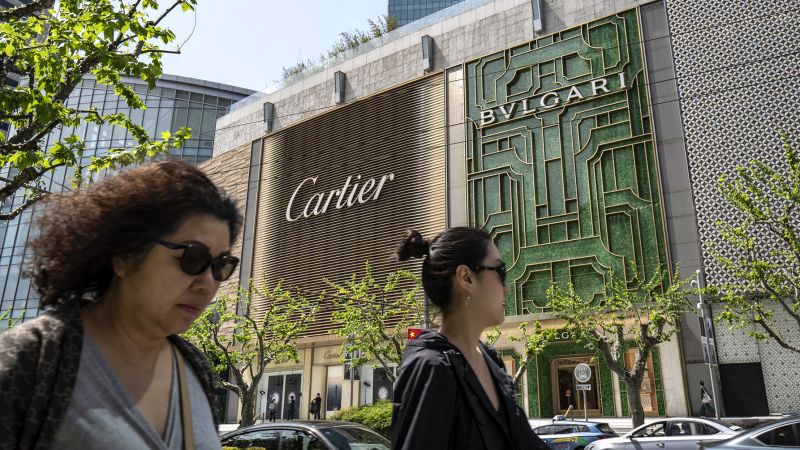The value of some of the world’s best-known luxury companies is plunging as Chinese consumers pull back on spending, with even the most exclusive brands feeling the pain.
First-half sales at Bernard Arnault’s luxury powerhouse LVMH, the owner of Louis Vuitton and Christian Dior, dropped 10% year over year in Asia excluding Japan, a region dominated by China. The rout seems to be accelerating, with those sales tumbling 14% in the second quarter, according to results published late Tuesday.
Shares in LVMH, whose offerings also include high-end jewelry and luxury hotel stays, dropped 4.7% Wednesday, their biggest one-day decline since October. The stock had pared some of its losses by Friday early afternoon in Paris, but was still 4.4% lower than before the earnings were released.
The numbers from the bellwether of the luxury industry also had a chilling effect on the stock of Prada, which has fallen 3% from its closing level Tuesday. The Hong Kong-listed company is due to report half-year results next week.
“For now, the (luxury) market remains volatile as investors reassess the once-held belief that luxury brands are a safe-haven investment, shielded from broader economic downturns,” Jochen Stanzl, chief market analyst at CMC Markets, told CNN.
Europe’s top 10 luxury companies have lost $250 billion in market value since March, Reuters reported Thursday.
The decline in LVMH’s fortunes in China chimes with steep falls in sales in the world’s second-biggest economy reported by Richemont, the owner of jeweler Cartier, and German carmarker Porsche.
Richemont, which saw sales crater 27% in China, Hong Kong and Macao in the three months to the end of June compared with a year prior, said a “low level of consumer confidence” was a key reason for the fall. Similarly, Porsche cited in part “weak demand in the luxury segment” in China.
Mercedes-Benz, another maker of luxury cars, also revealed a drop in sales Friday, albeit a smaller one, with revenue in its cars division dipping 4% in the second quarter. “The Chinese market contracted slightly; the market situation in the premium and luxury segment in China remained weak,” the company said.
Meanwhile, Gucci owner Kering said there was “a marked deceleration” in its revenue in China in the first six months of the year and “trends did not improve greatly in North America and Europe.”
However, Hermes bucked the trend. The company known for Birkin handbags — whose prices range from $10,000 to hundreds of thousands of dollars — and silk scarves reported sales growth in all countries in the Asia region, from which Hermes excludes Japan, in the first half of 2024.
The earnings reports reflect a striking turnaround in spending by Chinese shoppers, who splurged on premium goods following the lifting of pandemic restrictions, helping boost growth in the luxury sector.
It appears that China’s faltering economy is finally hurting many brands catering to even the most deep-pocketed consumers. The country is grappling with a number of challenges, from sluggish consumer spending and a persistent property slump to a mounting debt crisis in local governments.
China’s economy grew 4.7% year-on-year in the second quarter of the year, according to official data released last week, missing economists’ expectations and marking the weakest growth since the first quarter of 2023.
China’s economic slowdown may not be affecting all shoppers equally but it appears to be curbing ostentatious purchases by the wealthy, in what consultancy Bain & Company has called “luxury shame,” similar to what happened in the United States during the global financial crisis.
Olesya Dmitracova contributed reporting.
Read the full article here
